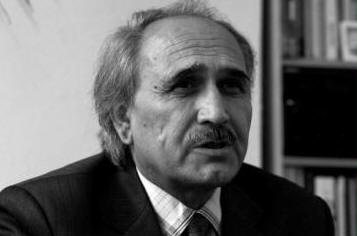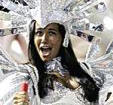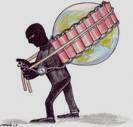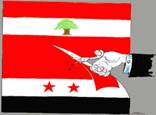Political Poetry, perhaps, was born when it stood against
politics and said: “I don’t accept you!” In other words,
political poetry originates from its encounter with politics. In
fact, when poetry withdraws from politics, it politicizes
itself, because abandoning politics is a politics of another
kind. Even the discussion on the relation of poetry with
politics is a political issue.
Initially the encounter of poetry with politics starts when
society, which is the source and breeding ground of poetry, is
monitored and administrated by politics. Politics wants the
society to be explained as it wants; however, poetry on the
other hand has a language of its own. Politics is bossy, thus in
the very first meeting it offers red, green and black spectacles
to poetry and commands it to look at world behind those glasses
and praise it. Nonetheless, poetry rejects this gift and answers
“I can see the world brighter without the glasses.”
This antagonism is a long lasting one. And today’s world
political poetry is but the memoir of this opposition. This tale
is “to be continued” for ages and at times politics replace the
eyeglasses with marks of burning iron bars. It is this story
that narrates that a thousand year ago; they put the burning
iron bars on eyes of Rodaki Samarqandi, one of Persian Dari’s
fathers, and blinded that great lord of poetry. Perhaps Rodaki,
my grand forefather, had not accepted a master’s gift.
By resisting the politics, poetry not only politicizes itself
but also proclaims its opposition with history, similar to
intellectuals who have always opposed history. With this view,
the great poets are great intellectuals too, because they are
not only in opposition with the tide of history and politics but
are in favor of its change as well.
When Hafiz says 700 year ago
بیا تا گل بر افشانیم و می در ساغر
اندازیم
فلک را سقف بشگافیم و طرح نو در اندازیم
Let us diffuse flower and pour wine in goblets
And pierce the roof of sky and establish a new system
He not only announces his opposition with the traditions of that
age, but also wishes its change.
Or when Naser Khosrow Balkhi, a great philosopher and poet of
Persian Dari, says in the 11th century:
من آنم که در پای خوکان نریزم
مراین قیمتی در لفظ دری را
I am not the one who spoils the invaluable pearls of Dari under
the feet of “pigs”
He truly stands for the reverences and purity of words and
conveys the message to the poets in palace, not to contaminate
the spotlessness of poetry.
These were examples of saying “no” to politics and the dominant
political structure.
However, it does not always occur like this. Sometimes poetry,
retreats to the ivory tower of isolation after withdrawing
politics. The poets domiciled in the ivory tower shut themselves
away from themselves and get swamped in making love to the
imaginary beloveds. The importance and value of this kind of
poetry is related merely to its literary and aesthetic aspects.
From the social or political points of view, it may be
considered as neutral.
Political poetry is not just a literary phenomenon of our era
but it has always existed and till the end of the world the
encounter of poetry with politics will continue; however, only
the methods of this opposition changes.
Moreover, it is of great significance to consider political
poetry and politicized poetry as two different concepts.
Political poetry, as said earlier, emerges from the antagonism
with dominant politics and political structure; whereas,
politicized poetry is the surrendered form of poetry to
political circumstances. Intellectual poets have always written
political poetry but they have never written poetry for politics
because they understand that doing so means mortifying
themselves and the poetry. Besides, as politics open a new
chapter, the politicized poetry serving that cause, dies too.
Had the world poets navigated their sails in the direction of
political winds, doubtlessly, neither we had Shahnamaye Ferdowsi
in the Persian poetry, nor had we
الیاد و ادیسه هومر و یاهم کمیدی الهی دانته in Western
poetry.
The worst example of politicized poetry is the 70 years of
socialism dominance. During this period in the socialist states,
poetry does not only become a variable to the ideological
politics and structures but also assumes an ideological nature.
It befall the worst disasters to literature of these countries,
Afghanistan was one of which. Today socialism is a part of
history together with all it red and black ideas and thus
socialistic realism has also faded away.
Political poetry is deeply rooted in Persian Dari. In fact,
poetry started in this language with politics. Hanzala Badghisi,
who is considered as the first poet of Persian Dari, lived in
early 9th century. This piece attributed to him is
thought to be the first one in Persian Dari.
مهتری گر به کام شیر در است
شو خطرکن زکام شیر بجوی
یا بزرگی و عزو نعمت وجاه
یا چومردانت مرگ رویا روی
Even if eminence is in lion’s mouth
Risk to achieve it
Either dignity, respect and esteem
Or a man’s death
Hanzala had written this piece when his country was in great
plight under the Arab atrocity. In this piece he compares
freedom and death and encourages people to freedom, pride and
fight against foreign invasion. The theme of this poetry is
resistance and thus it can be said that both political and
resistance poetry in Persian Dari starts from 9th
century.
However, the discourse of modern political poetry in
Afghanistan dates back to early 20th century. The
publication of Saraj-ul-Akhbar daily in 1911 may be considered
the advent of modern era in political poetry of Afghanistan.
Political poetry was interwoven with “Mashroteyat” or
“Constitutional” movements in those times. This movement was
commenced by Afghan intellectuals, writers, poets and social
activists with an aim to ensure complete political freedom and
constitutional system in Afghanistan.
Following that in the democracy decade (1963 – 1973) political
poetry got mixed with right and left ideologies. Another outcome
of this decade was the creation of communists and Islamic
political organizations and political parties. All these
organization widely used poetry as a means of propagating their
ideological thoughts.
Left Communist movements considered poetry as an effective
weapon which should not have been put on ground. In that period
the concepts of proletarian revolution, praising proletariat,
the peasant, socialism and Linen was recorded for the first time
in Persian Dari literature history. The poetry structures
introduced in the beginning of the century were developed
primarily by the poets affiliated with communist movements. One
of the characteristics of that period’s poetry was its
ideological and rebellious nature which invited people to revolt
against the government.
The communist coup d'état in 1978 linked poetry to political and
ideological structures more than any time in Afghanistan’s
history. In those years, there was a line which existed every
where. It was a red line which divided people to the
revolutionary and reactionary fractions. This line divided the
poets to two parts of revolutionary and reactionary poets as
well. The party poets who wrote poetry against the government in
the democracy decade, had turned into the admirers of government
and would despise the independent poets.
The independent poets mainly faced three fates. Some of them
were executed in Pul-e Charkhi prison. Some others spent theirs
lives behind the bar and the remaining fled into Iran and
Pakistan and established the overseas resistance literature.
Afghan literature, on one hand, greatly underwent politicized,
ideological and governmental experiences in those years. On the
other, the resistance poetry became more prominent than ever.
Particularly in 1980’s internal resistance poetry flourished
greatly.
It is worth-mentioning that no government in Afghanistan, in
order to pursue its political aims, misused literature and arts
more than the puppet communist regime. This not only paved the
way for ideological, governmental and politicized literature but
also provided a good ground for anti-government literature.
The poets affiliated with Jihadi groups had an instrumental
approach with poetry too. After the triumph of Mujahidin over
the communists, the Jihadi poets turned into governmental poets
and considered the other poets remaining in Kabul as communists.
The Mujahidin reign was a period of severe bloodshed in Kabul;
however, these incidents had not been reflected in writings of
Jihadi poets at all. In that period, Mujahidin burned thousands
of books published during the communists’ regime as woods in
heaters. I myself was a witness of thousands books of
“Afghanistan Writers Association” being burnt by them. Caravans
of refugees from Afghanistan became more and more and more poets
deserted the country.
Taliban who entered Kabul with rhythmic slogans, opposed
romantic poetry because they considered it would promote ethical
vice among young people. Locking the doors of cultural and
artistic centers, they made the poets understood that
Afghanistan was no longer a suitable place for them. As a
result, many well-known poets left the country, many of whom
migrated to Peshawar, Pakistan. This led to another expansion of
Afghan cultural activities in Peshawar.
Women’s poetry could hardly breathe during Mujahidin rule in
Afghanistan and completely muted during the Taliban’s.
Compelling everyone to observe silence, the whips left no
well-known women poet remain in the country.
Afghanistan has entered a new phase of socio-political life
since the collapse of Taliban in November 2001
Seemingly, there are some proving grounds for nurturing and
promoting poetry in the country. The country has joined the PEN
International as a dynamic member, and has currently a
functioning Afghan PEN in its capital city, Kabul
Still, needless to say, both literature in general and poetry in
particular have been seriously marginalized by other practical
means of life. This in turn has resulted in placing Afghan
intellectual (both writers and poets) in an awkward situation.
They have mainly been feeling isolated, cornered and suffering
from significant down mood.
Undoubted, Afghan writers and poet presume their existence as
low-cast strata, and almost as aimless as paper trash trivia.
The current wave of poetry in Afghanistan maintain its presence
in a number of those highly-committed poets and writers who see
their destiny tightly inter-related to their literary products.
The once-powerful voice of Afghan poem has been mainly
under-echoed and therefore has remained less-heard. The chaos of
widespread noises of explosion, violence and firing are becoming
a kind of daily routine over-shadowing literature in general.
The prospect hardly seems to be a joy. The vision and the "prime
objective" that used to be the greatest motif for composing
quality poem are no more as tangible as they once were. As a
country, widely based on "visualization", Afghanistan is on the
grips of "free market" now. It may be safe to say that the then
highly-observed-vision has painfully undergone the fever of
market and the so-called market values.
The unavoidable influence of English commonly-used terminologies
in Farsi and Pashto is another notable challenge for these two
local Afghan languages. It is quite evident that the course of
time will sooner or later display a mosaic of "ready made"
languages, perhaps called Englo-Persian (Pers-English) and
Englo-Pashtu (Pasht-English).
Presently, English is the dominant and prevailing medium of
communication in over 2000 National and International
Afghanistan-based NGOs offices, and a wide range of governmental
institutions. Moreover, the burning desire to learn English and
various computer programs (which of course are in English) is
attracting a huge number of youth. This not only hinders the
enthusiasm to better learn their mother tongue but affects the
indigenous process of learning science and culture in their
initial language as well.
In the absence of a clear and specific cultural policy, the
Afghan Ministry of Information and Culture has been unable to
publish as minimum as five books in the span of five years
Still, it is striking to note that a peculiar type of
"resistance poetry" is on once again on the verge of emerging
from the existing wave of poem, most of which appears as satire.
To conclude, a thorough and meticulous research of poetry in
general and political poetry in particular in the post-Taliban
years is yet to be undertaken.
Political poems have gradually gained more strength. Presumably,
poetry and politics have been and still are proceeding along as
two co-travelers, marching as two parallel vectors.
Can this notion still exist that poetry does not have any
feature but to praise beauty and bring joy and we shall not load
the heavy burden of social and political issues on its soft
shoulders? I do not know, but I feel this notion can only exist
in a utopia, where love rules, where triggers are unknown to
hands, where ears and unfamiliar to explosions and where freedom
is another name for life. But in a country where one’s Musalmani
“Belief in Islam” is measured form the length of his beards, and
its city’s rivers smell blood and where blood grows instead of
red flowers in the garden and where bread is the hot
topic, poetry can never be a silent spectator sitting in its
beautiful ivory tower. Yes, if poetry is not political in such
lands, it should be made political.
8th Oct 2006






